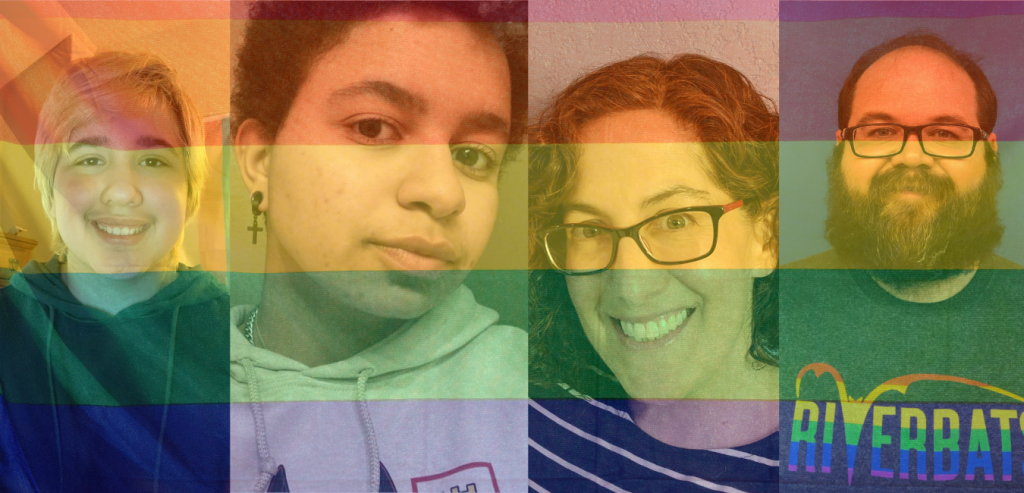By: Kyrios LoNigro
This year is seemingly the worst on record for LGBT+ equality. More than 250 anti-LGBT+ bills have been introduced in state legislatures across the U.S. Texas is the leading state with 12 bills being proposed this legislative session, targeting transgender youth. One banning a type of school sports participation and, another, health care access to transgender children. and another. Debates over transgender people living freely in the U.S. have been shown to have negative consequences on their mental health.
Mateo Marquez, theater student, says his K-12 experience was exhausting. In high school he encountered more than name-calling, just for being a transgender student.
“Freshman year I was threatened,” Marquez said. “I was harassed [by one specific classmate.]”
Marquez’s classmate told others at school that transgender people needed to die. Despite this harassment, Marquez says the school did not seek disciplinary action against the boy. This type of discrimination causes many transgender students to drop out of school.
The Trevor Project is the country’s biggest LGBT+ youth crisis phone line, focused on supporting suicide prevention efforts for those under the age of 25. Phone calls drastically increase when when trans-phobic rhetoric circulates and bills are proposed.
Missi Patterson an ALLY at ACC said, “I hear so many people in the lawmaking community say, ‘You’re either a man or a woman. It’s just science.’ I want them to understand that that’s not even true.”
Texas and Florida are the two top states with the most instances of Fatal Anti-Trans violence, according to the Human Rights Campaign.
“It’s scary because your life is at risk here – they’re making fun of you solely because you’re trans.” Marquez said. “You don’t want to be hate-crimed for it, but you also want to stick up for yourself.”
Ari Thomas, a health science student who is also gay and non binary. Although they believe their sexuality hasn’t received negative responses at ACC, they have not come out as non-binary.
“I’ve never had anybody say anything to me just because I’m gay,” said Thomas. “People don’t know I’m non binary at ACC but that’s mostly because I’m doing online classes and haven’t gone to in-person classes yet.”
Thomas expressed that if they did encounter discrimination they wouldn’t know how to handle it due to lack of face-to-face interactions with instructors in remote classes and online information.
“I’ve never seen anything LGBT related on the website,” said Thomas.
Neither Marquez nor Thomas knew about ACC’s LGBT+ Equity Committee, whose aim is to provide education to faculty, staff, and students at ACC about LGBT+ issues.
A primary component of the committee is their advocacy for long-term systemic change that can be achieved by policy revisions and support networks through their ALLY program and events.
Despite one of the committee’s goals of providing support, the committee is not often easily accessible. A Google search brings you to their Facebook where little information is provided on the committee – only their email.
“You have to know how to search for us,” Matthew Campbell, co-chair of ACC’s LGBT+ Equity Committee, said. Campbell said the secrecy is due to bigoted language they have received in response to trying to reach students through ACC’s email contact lists.
“It’s usually on the lines of homophobic or religiously motivated,” Campbell said. “We don’t do that anymore.”
Campbell also shared the committee is working with ACC to require students to participate in sensitivity training to mitigate the issue after they expand their ALLY program. So, for the moment, the committee is building their own email lists and operating by word of mouth.
“All organizations have to go through a chain to be able to access those email addresses,” Campbell said.
Interested students must opt into receiving their newsletters and emails. Campbell shared that the committee has been receiving more engagement recently, but the pandemic has made connecting to students difficult, being that information isn’t as easily found on posters on campus or other ways.
In her psychology class, Patters creates space for her LGBT+ students by asking them to put their pronouns in their zoom names. Additionally, she asks them to provide their preferred name at the beginning of class.
The Ally Program trains ACC employees to create space and support for LGBT+ students. Employees of ACC can become an ally by filling out an interest form. Interested parties will be notified when a training is available.
“[The training] wasn’t difficult at all,” Patterson said. “We had an incredible guest speaker from UT and it was really enjoyable.”
In addition to the ALLY training, Patterson recommends training on how to be an advocate through organizations like the Texas Freedom Network, Texas Rising, and Equality Texas.
Many LGBT+ youth and adults are not accepting of these bills filled with trans-phobic rhetoric being proposed into the Texas legislature.
“We don’t need people checking our genitals. End of story. We are who we are. We are just like everyone else,” Marquez said.



